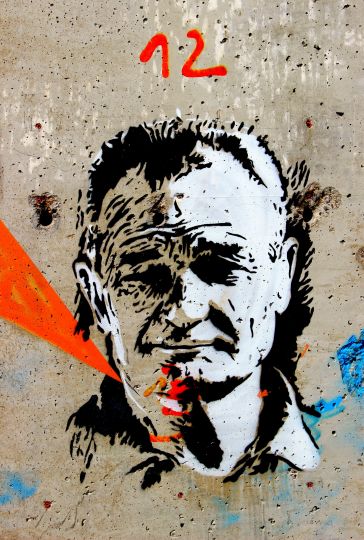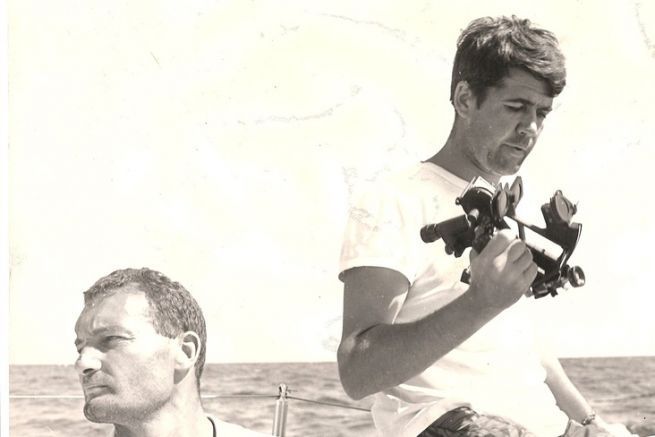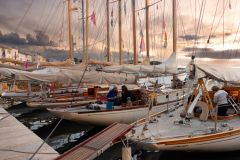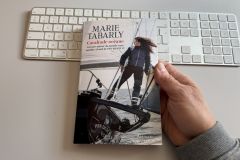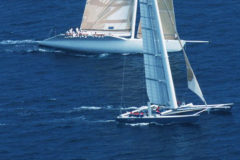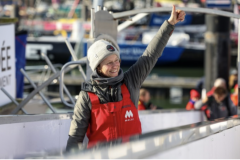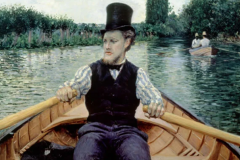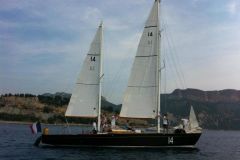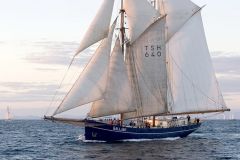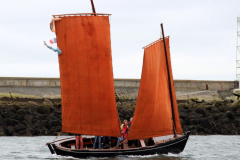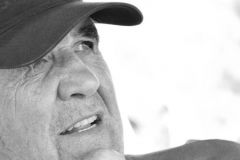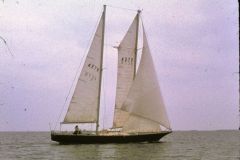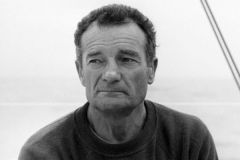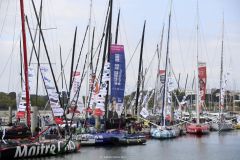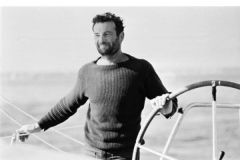It was from La Baule that we had the chance to talk to Gerard Petipas, the legendary Pen Duick navigator. This experienced man was kind enough to give himself over to the exercise of the no questions asked interview. Sort of a discussion on board, as we would all have it for a watch, when you have to keep your eyes open for the day before.
Isabelle, constant companion
When we try to approach Mr. Petipas, we first go through Isabelle, his wife.
She calls you on the phone and, being friendly and accommodating, she introduces herself as " mr Petipas' secretariat ". If you are not interested in it, it will remain unknown to you. One more secretary on the phone will open the doors to the coveted star. But if you are interested in human beings, you will have the chance to speak with a lady who also talks about Eric and Gerard. Behind every great sailor there is a woman? This introduction, therefore, is to thank Isabelle, Anne and all those strangers in the shadows that we contact, again and again, and who make it easier for us to talk. May they all be thanked for their work, most often on a voluntary basis, in the service of the image of their sailors' spouses.
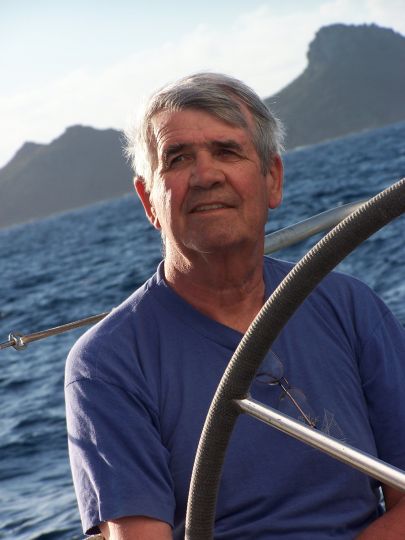
A passionate teacher
Gérard Petipas, 81 spring. The man we have on the phone is quick-witted and knows what he's talking about. The sea, the boats, the races, maritime history. He will help you understand ocean racing by explaining what routes the Corinthians took to trade with the men of the north. A few moments later, he will have seized the opportunity of the corner of a sentence to tell you about the performance of such and such a hull in the South Sea.
The grey eminence of Tabarly is one of those men that culture makes human and humble.
Navigator?
Wanting to define, with him, his job as a navigator is not as simple as it seems. But he explains it to us better than anyone else: " Before moving on the water, the navigator's job is to know where he is on the water. Strictly speaking, there are no longer any sailors racing, as technological solutions exist today to find their bearings. It's really good for the competitors in the races to be able to find their position at the click of a mouse. At the time, we needed our height lines, three times a day with the sun and once a night with the moon. One route rather than another according to the weather forecast, according to sea and wind observations too.
In short, on a delicate mix between feeling and fact. Once the position of the boat was established, the weather observed and the possible routes defined, I proposed options to the skipper. It was he, in the last resort, who decided on the route taken, the course followed and the navigation strategy. "
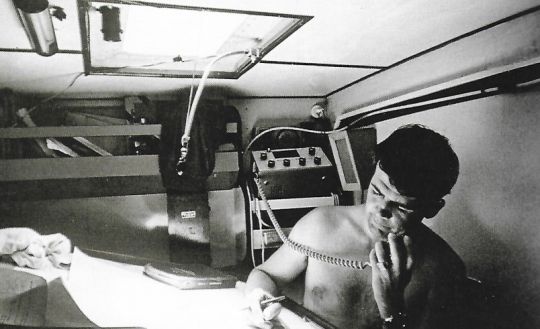
Talking about things other than the sea
Surprisingly, Gerard speaks. He speaks much more than the legend of the sailors' lover's mummy lets him think. Is it that, in the end, it's only when we talk to them about the sea that seafarers don't talk?
" We are often asked only about our relationship to the sea, boats or racing. It is particularly nice to be able to talk about other subjects. The sea is one of our specialities, everyone has their own speciality and likes to talk about it in particular, but not only. At sea, as in everything else, we don't master anything. On the water, alone, with my family or with Eric, I have constantly learned and I continue to learn. At sea, you don't know, you learn. You never stop learning, every time you set foot on a boat. At sea, you're very small, we're all small. Anyone who thinks he can win at sea is heading for failure. It's not the famous humility in the middle, but a truth. And it is as we sail along that we discover how ignorant we are. The real talent lies in not showing that you are facing the unknown. Few people are capable of that. Eric was one of them. "
He adds, while we wait for the legend to be interrogated...
Details he gives " When we lost the rudder in the middle of the Atlantic, of course the situation was critical. Eric reacted calmly and calmly, without panic. Anyone who saw him would have thought he was a regular at losing rudder. He landed for a few minutes and proposed a rescue solution. Then he implemented it in such a way that panic or anxiety would never break out. "
To conclude: " That's the natural talent of a commander. Knowing how to reassure your crew no matter what. "
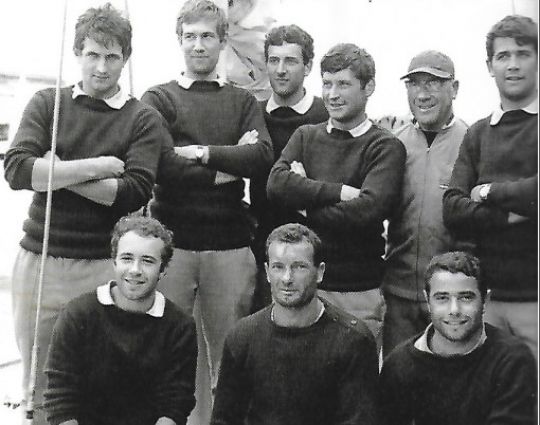
Commander, a human first
Commander, he is in his soul, the navigator of Pen Duick. It's his first job, by the way: Captain of the Merchant Navy.
He explains to us, " A good commander is above all a beacon to which the crew will turn for all decisions and questions. You have to be a human being, a manager, a psychologist as well as a navigator and an engineer. Above all, you have to know how to be a human being who is available to others. A guy like Eric loved people, contrary to legend. He loved the human and sporting investment of single-handed racing, but preferred to sail with a crew. He knew how to create his crew, a Kersauson for humour and fun, a Gérard for management and finances, a Tabarly for the sportsman. An alchemy was created and made it work. "
His conclusion: " A true skipper is above all a human being ".
Fortuitous meeting with the skipper from Nantes
Everything has been said, written, over and over again, about the life of Gérard Petipas with the skipper. Talking to him once again about the competitor from Nantes would have been an insult to the sailor from Granville. He met the skipper fortuitously: " I was sailing on a boat from Granville. In the '60s, not many French boats would race to England. I was preparing to participate in the Cowes - Dinard race. At that time, I was sailing a small 6-metre boat and Eric, who is passionate about all boats, came to look at ours. That's when we saw each other. A discussion, nothing more. ".
It's in the races that things get formalized." Then we met on the race itself. In the end, I had to take the boat back to Granville and had nothing really planned after this delivery. Eric asked me what my plans were. We left, together, for the Channel Islands. Chausey, the Ecréhous, the Minquiers. A minefield, which I liked to tackle. Eric saw it. Our relationship was born.. ", he explains, before adding full of modesty: " Friendship would be born, as time went on. "
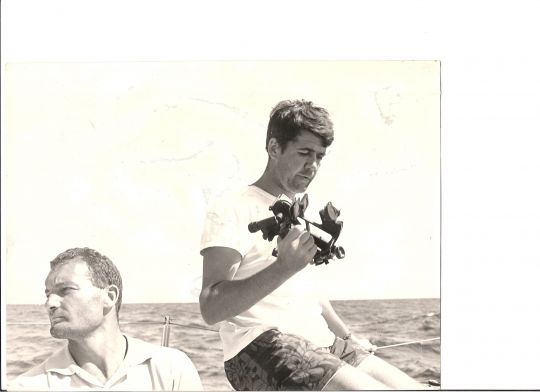
Race creator
A creator of races of genius, Gérard Petipas has left his mark on the events that still criss-cross the globe today. The Transat Jacques Vabre is one of them, and he tells us this story: "The Transat Jacques Vabre is one of them Created in 1993, it was then called the Route du Café. The main sponsor of the race was Jacques Vabre. Although the race itself didn't go too badly, the organisation around it was very messy. Pascal Bourdin, then in charge of the Jacques Vabre brand within Mondelez, came to ask me to submit a project for the organisation of the race. A call for tenders was about to go out. I explained to him that I wasn't planning to propose a single-handed race, and then we left it at that. "
Defender of the double race
Dossier filed, therefore, Gérard Petipas continues " I propose a double race. Counting and file review. Pascal explains to me that it's a single-handed race that he wants. I explained the advantages of a double-handed race to him. The safety of a race during which there are 2 pairs of eyes. The speed, mathematically, you go twice as fast with two people as alone, there's no slow-motion period. And humanly speaking, by having two skippers cohabit in a boat, we're achieving a human adventure. And brands such as his need human adventures with great stories to tell. "
Proud of himself, Gerard manages to convince the big boss of the merits of his idea. The Jacques Vabre will therefore be a double-handed race. The reasons are simple" Single-handed racing is a very French concept, we are probably one of the only countries in the world to practice it. Proof of this is that at the start in Le Havre of the first real Jacques Vabre, ten nations were on the starting line. "
The sailor is a fine tactician, whether it's a question of creating a route at sea or inventing a race, he knows how to implement a real capacity for negotiation.
The race for Europe
Creator of the Course de l'Europe in 1985, he explains its philosophy to us. " I was then a convinced European, certain of the merits of the Europe programme and the EEC at the time. I believe that the sea remains and has always been a link between people. If Marseilles was created, if Carthage shone, if Calais exists, it is because since the 12th century, men have gone out on the water to meet the Terra Incognita. "
It is from this idea of reaching out to other peoples that the idea of the Europe Race was born. He wonders, with Eric Tabarly " Why not hold a race that will bring together the countries of the continent? ". One contact fostering another, the duo entered into a relationship with Jacques Delors, then President of the Commission. " Delors needed symbols, to express the possibility of a united Europe. He wanted something to make his ideal a reality. So naturally I told him about this race that would link, in short stages, important cities of the EEC ".
The complex alchemy of creating a race
The race organizer explains to us " When you create a race, you have to please the sailors, who need symbols. Sailors want to arrive in stages that mean something in their world, Brest, Marseille, Oostende, Genoa or Piraeus. Secondly, we need to attract sponsors by giving them the opportunity to be seen. Either show themselves in markets they already know or explore new markets. Finally, local people, politicians, associations and municipalities must play the game. "
Of course, not everything goes smoothly. Editorialists are having a field day against this race for small arms. As Jean-Michel Barrault will write in the Figaro " We're going on a lovely tour of the beaches! ".
A friendly tour of the beaches, it was a political caravan that quickly grasped the potential of such a race. Its creator explains: " At every stopover, we enjoyed the presence of Heads of State or Government. We had Mitterrand, Rocard, the King of Spain, the King of Belgium to name but a few. "
He goes on." We innovated by conceiving the notion of a village around the race, at the start and at the finish. The race, because that's what it was all about, was an exciting opportunity. The format of short stages allowed us to really meet the public and make sailing more democratic ", explains Gérard Petipas.
Nevertheless, the energy required for such an organization has been overwhelming." Too much work and not enough time. And a feeling of doing the same thing over and over again. We've let the race go downhill. "The last edition of the European race was held in 1999.
Take a step back from the middle, but still navigate
Adventurer Gerard Petipas has stepped back from the middle" In 2005, I sold all my shares in Pen Duick. I am no longer active in sailing. I still hold a few honorary titles, but at 81 I no longer have the energy to do everything I used to do. And you have to make room for younger and more creative people too. Clinging to a chair is not good for the chair or the person in it. "
Stepping back does not mean idleness, because Gerard cannot remain inactive.
" I just turned 81, that's pretty good for me. I'm going to try to stay fit, enjoy my grandchildren. I'm going to continue to enjoy life, the sea and boats. I go out on the water frequently, but only on cruises and with my family. We usually go to Turkey or the West Indies, depending on our moods or desires. The boat is the ideal place to see your family grow up. Children, grandchildren, everyone is on board and, inevitably, the tension loosens. The kids are within sight, there's no need for authority to make sure they don't do anything wrong. "
For the anecdote, the navigator does not own any boat. " I don't own a boat. I've never owned my own boat, I've only ever used other people's boats, Eric's especially. I prefer to rent, a boat is far too much of a burden, especially at my age. "
Age and the passage of time seem to be real obsessions for the double-handed racer who became a solo racer in June 1998 with the death of Eric Tabarly. He regrets, " At my age, there are so many things you can do that you can't do. It's frustrating to know what you should do and then not do it, just because you can't take the risk. So I take the stand and I order. I enjoy it immensely. "
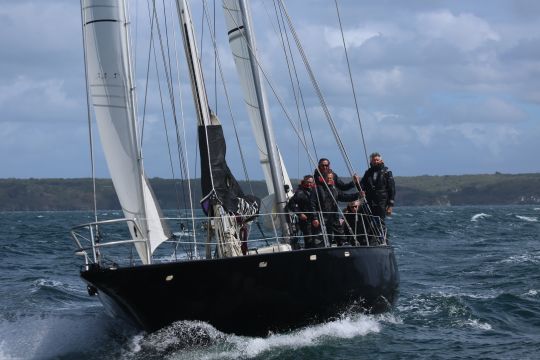
Speaking of boats, what's Patitpas' favorite?
Which one was Gerard's favourite in his entire career? " Pen Duick III, no doubt. It was the one that was the most balanced and the best compromise. It's the only one that was designed by Eric, it had his trademark. We ran 7 races his first year and won them all. It's not without reason, the crew doesn't do everything. Pen Duick III is a human-sized boat, rigged and manoeuvrable without a full army as a crew. It is also in my opinion the most beautiful of the series. When she returned to the association I had the pleasure of leading, I had her regreted as a schooner. He found his soul, Eric's soul. He is splendid as he was. "
